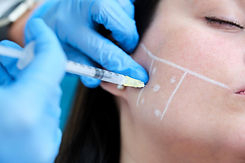Via Ugo Foscolo, 4
20121 Milan
Via Privata Ugo Ricci, 3
22063 Cantù
AEM CLINIC
AESTHETIC AND REGENERATIVE MEDICINE

Bruxism
Teeth Grinding and Clenching
Bruxism is a condition characterized by clenching and grinding of the teeth. It often occurs during sleep, but can also occur during the day. Bruxism can cause significant damage to the teeth and negatively impact the quality of life. Let's find out together the causes, symptoms and possible treatments.



Bruxism
Bruxism, characterized by clenching and grinding of the teeth, can cause significant discomfort and dental damage. An innovative treatment to alleviate this condition is the use of neuromodulators. The neuromodulator works by relaxing the muscles involved in bruxism, namely the masseter muscles, reducing their activity, the force of clenching and grinding of the teeth is reduced. This leads to a relief of pain and muscle tension, as well as preventing tooth wear.
Treatment Benefits:
- Pain Relief: Reduce jaw pain and headaches associated with bruxism.
- Teeth Protection: Prevent wear and tear on teeth caused by grinding.
- Improved Sleep: Reduce sleep disturbances related to nocturnal bruxism.
- Non-Invasive Treatment: Non-invasive procedure with immediate recovery times.

Bruxism
Causes, symptoms and treatments.
01
Causes of Bruxism
The causes of bruxism are not fully understood, but several factors can contribute to the development of this condition:
-
Stress and Anxiety: Bruxism is often associated with periods of stress and anxiety. Emotional tension can cause you to clench your teeth unconsciously.
-
Sleep Disorders: Problems such as sleep apnea and snoring can be linked to nocturnal bruxism.
-
Malocclusions: Abnormalities in the closure of the teeth can contribute to grinding.
-
Genetic Factors: Genetic predisposition can play a role in the development of bruxism.
-
Lifestyle: Excessive alcohol, caffeine and smoking consumption can increase the risk of bruxism.
02
Symptoms of Bruxism
Symptoms of bruxism can range from mild to severe and include:
-
Jaw Pain: Pain or tightness in the jaw and facial muscles.
-
Headaches: Frequent headaches, especially upon awakening.
-
Tooth Wear: Chipped, worn, or loose teeth.
-
Ear Pain: Pain that is not caused by ear problems.
-
Sleep Problems: Disturbed sleep and frequent awakenings.
03
Bruxism Treatments
There are several treatment options to manage bruxism:
-
Night Bites: Night braces can protect your teeth and relieve muscle tension, but they do not block the cause of the problem, which is muscle overactivation.
-
Neuromodulator Therapy: The treatment is quick and simple. After a preliminary examination, the doctor treats the masseter muscles. The procedure takes only a few minutes and the effects can be noticed within a few days, with a duration of about 6 months. You can repeat the treatment periodically to maintain the benefits.
04
Bruxism Prevention
Bruxism is a common condition that can have significant consequences on your dental and general health. Recognizing the symptoms and seeking appropriate treatment is key to preventing long-term damage. If you suspect you may be suffering from bruxism, consult your doctor for an evaluation and personalized treatment plan.

